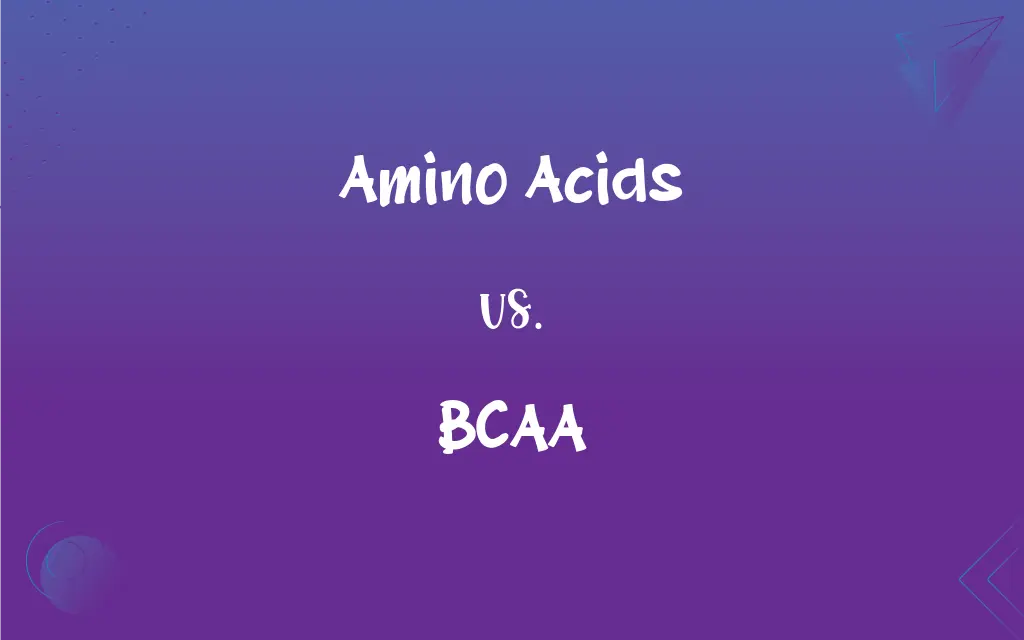Amino Acids vs. BCAA: What's the Difference?
Edited by Janet White || By Harlon Moss || Updated on October 26, 2023
Amino acids are organic compounds forming proteins; BCAAs are a subgroup of three essential amino acids vital for muscle synthesis.

Key Differences
Amino acids are the building blocks of proteins, essential for numerous bodily functions. BCAAs, or branched-chain amino acids, are a specific group of three essential amino acids: leucine, isoleucine, and valine.
There are 20 amino acids that form proteins in the human body, with each having a unique structure and function. BCAAs, being part of these 20, are particularly known for their role in muscle growth and energy production.
Essential amino acids are those that the body cannot produce and must be obtained through diet. BCAAs fall into this category, emphasizing their importance in nutrition, especially for athletes.
Amino acids not only build proteins but also play a role in neurotransmitter synthesis and immune function. BCAAs, while part of this group, are often singled out for their role in reducing muscle soreness and fatigue.
The study of amino acids covers a vast range of biological functions, from metabolism to cell signaling. BCAAs, due to their structure, are primarily associated with muscle protein synthesis and energy production during exercise.
ADVERTISEMENT
Comparison Chart
Definition
Organic compounds forming proteins
A subgroup of three essential amino acids
Total Number
20 in human protein synthesis
3 (leucine, isoleucine, valine)
Role
Broad, includes protein synthesis
Specific to muscle synthesis, energy production
Essentiality
9 are essential
All 3 BCAAs are essential
Dietary Importance
Essential for overall health
Particularly important for athletes, muscle repair
ADVERTISEMENT
Amino Acids and BCAA Definitions
Amino Acids
Building blocks of proteins.
Amino acids are crucial for muscle repair.
BCAA
Three essential amino acids: leucine, isoleucine, valine.
BCAAs are popular among bodybuilders.
Amino Acids
Include essential and non-essential types.
Some amino acids are produced by the body.
BCAA
Promote muscle protein synthesis.
Taking BCAAs can help with muscle growth.
Amino Acids
Organic compounds with amine and carboxyl groups.
Each amino acid has a unique structure.
BCAA
Reduce muscle soreness post-exercise.
Many athletes use BCAAs for recovery.
Amino Acids
Involved in neurotransmitter synthesis.
Certain amino acids affect brain function.
BCAA
Cannot be produced by the body.
BCAAs must be obtained from food or supplements.
Amino Acids
Essential for various biological functions.
Amino acids contribute to immune health.
BCAA
Provide energy during prolonged exercise.
BCAAs can reduce fatigue during workouts.
FAQs
Do vegetarians get enough BCAAs?
With a balanced diet, yes, though supplements can help.
Can the body produce BCAAs?
No, they must be ingested through diet or supplements.
How many amino acids are essential?
9 out of 20 are essential.
Can excess amino acids be harmful?
Excessive intake can strain the kidneys.
How are essential amino acids different?
They can't be produced by the body.
Are all amino acids found in protein?
Yes, they're the building blocks of proteins.
Are amino acids only found in meat?
No, they're also in plant-based foods.
Can BCAAs cause liver damage?
Rarely, and usually only with pre-existing conditions.
Are BCAAs vegan-friendly?
Synthetic BCAA supplements can be vegan.
Can BCAAs improve sleep?
Some find them helpful, though evidence is mixed.
Why are amino acids important?
They're essential for protein synthesis and various body functions.
Do BCAAs help with weight loss?
They can support muscle maintenance during weight loss.
What makes BCAAs unique?
Their structure and specific role in muscle metabolism.
Can BCAAs improve exercise performance?
They can reduce fatigue and aid recovery.
When should BCAAs be taken?
Before or after workouts for best results.
Is it safe to take BCAA supplements?
Generally, yes, but consult a healthcare provider if unsure.
What foods are high in amino acids?
Meat, dairy, soy, legumes, and nuts.
Do amino acids help with aging?
They can support muscle and skin health.
Do amino acids affect mood?
Some play a role in neurotransmitter production.
Are amino acid supplements necessary?
Not for everyone; it depends on dietary intake.
About Author
Written by
Harlon MossHarlon is a seasoned quality moderator and accomplished content writer for Difference Wiki. An alumnus of the prestigious University of California, he earned his degree in Computer Science. Leveraging his academic background, Harlon brings a meticulous and informed perspective to his work, ensuring content accuracy and excellence.
Edited by
Janet WhiteJanet White has been an esteemed writer and blogger for Difference Wiki. Holding a Master's degree in Science and Medical Journalism from the prestigious Boston University, she has consistently demonstrated her expertise and passion for her field. When she's not immersed in her work, Janet relishes her time exercising, delving into a good book, and cherishing moments with friends and family.































































